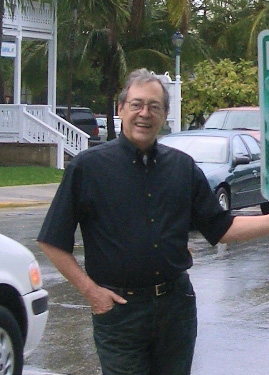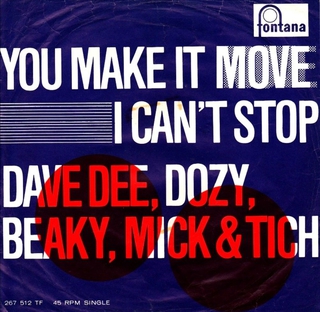Basis of the chart
Look up
fab in Wiktionary, the free dictionary.
"Fab" (short for "fabulous") was a very fashionable adjective in the mid-1960s, associated with the Beatles, who were known as the "Fab Four", and much used by such trend-setters as Cathy McGowan, who presented the weekly rock music show Ready Steady Go! on independent television.
Unlike the charts published in the Melody Maker , New Musical Express and other music papers (or, for that matter, used by the BBC or the rival pirate station Radio Caroline [1] ), the Fab 40 was not based on sales of records. Thus, although it mostly contained what was current and popular, it was often ahead of movements in the authentic charts and was subject to more dramatic fluctuations. Whereas, in the sales charts of the 1960s, many records would climb in stages and then drop gradually, a record might suddenly emerge near the top of the Fab 40 one week and disappear from it the next. Equally, there was often room for records to scale the higher echelons of the Fab 40 without entering the sales charts at all (for example, the Settlers' Nowhere Man in March 1966 [2] ). As a result, a number of records that are well remembered from the mid-1960s were not, in fact, particularly successful in commercial terms.
Fab 40 show
The Fab 40 was unveiled each week during a three-hour programme at lunchtime on Sunday (11 am to 2 pm), which, through such programmes as Family Favourites and Beyond Our Ken , the BBC had established as a prime time for radio listening. The show, which followed the Colgate-Palmolive Request Hour, was presented by the station's disc jockeys on a rotational basis. This format largely mirrored that of the BBC's Pick of the Pops , which Alan Freeman had presented each Sunday on the Light Programme since 1961. [3]
The final Fab 40 show was introduced by Tommy Vance on 6 August 1967, the number one record that week being the Beach Boys' Heroes and Villains , which entered the chart in the top position [4] (whereas, in terms of sales, it entered the British top 20 a month later and reached no higher than number eight [5] ). Radio London closed on 14 August 1967 following enactment of the Marine, &c., Broadcasting (Offences) Act 1967 that, in effect, outlawed such stations. In August 2007 the final "Fab 40" was re-presented by former Radio London disc jockey Dave Cash as part of a celebration on BBC Radio Essex to mark the fortieth anniversary of the pirates' demise. On 14 August 2022, John Peters recreated this Big L Fab 40 chart rundown for Boom Radio's day Celebrating the Pirates, 55 years after Wonderful Radio London closed, in association with Chris and Mary Payne of tribute site radiolondon.co.uk. [6] [7] [8] [9]
When the BBC opened its own "pop" station Radio 1 in September 1967, its sales-based top 30 chart was known informally for a time as the "Fun 30", [10] no doubt in imitation of London's "Fab 40".
Reconstructing the Fab 40
Some 30–40 years after they were in use, meticulous attempts were made to reconstruct the Fab 40 charts by Radio London Ltd. These drew on surviving lists prepared between 1965 and 1967, at Radio London's offices at 17 Curzon Street in London and informal ones compiled at the time by listeners, although there were sometimes discrepancies between the "official" list and the records that were actually delivered to the ship, the MV Galaxy . [11] Complete charts are available on the Radio London website, from 24 January 1965, five weeks after the station opened, till the final Fab 40, 6 August 1967 and are regularly updated with new information and input from featured artists. The first Fab 40 anticipated the sales chart a week later, [12] when the Moody Blues were at number one with "Go Now". [13]

BBC Radio is an operational business division and service of the state media outlet British Broadcasting Corporation. The service provides national radio stations covering the majority of musical genres, as well as local radio stations covering local news, affairs and interests. It also oversees online audio content.

Radio London, also known as Big L and Wonderful Radio London, was a top 40 offshore commercial station that operated from 23 December 1964 to 14 August 1967, from a ship anchored in the North Sea, three and a half miles (5.6 km) off Frinton-on-Sea, Essex, England.
Radio Scotland was an offshore pirate radio station broadcasting on 1241 kHz mediumwave, created by Tommy Shields in 1965. The station was on the former lightship L.V. Comet, which had been fitted out as a radio station in Guernsey using RCA technology and engineers, it was anchored at locations off Scotland, usually outside territorial waters.

Michael Joseph Pasternak, known by his stage name Emperor Rosko, is an American presenter of rock music programmes, most widely known for his shows on Radio Caroline and BBC Radio 1 in the UK in the 1960s and early 1970s.

Richard Anthony Crispian Francis Prew Hope-Weston, known professionally as Tommy Vance, was an English radio broadcaster. He was an important factor in the rise of the new wave of British heavy metal, along with London-based disc jockey Neal Kay, in the late 1970s and early 1980s. Vance was one of the first radio hosts in the United Kingdom to broadcast hard rock and heavy metal in the early 1980s, providing the only national radio forum for both bands and fans. The Friday Rock Show that he hosted gave new bands airtime for their music and fans an opportunity to hear it. He used a personal tag-line of "TV on the radio". His voice was heard by millions around the world announcing the Wembley Stadium acts at Live Aid in 1985.
Top Gear is a BBC Radio programme broadcast between 1964 and 1975. It was known for its specially recorded sessions in addition to playing records. Top Gear began life in 1964 on the BBC Light Programme and was revived with a progressive rock focus in 1967 on BBC Radio 1, running with that format until its end in 1975. After its demise, host John Peel kept the same format for his own show on Radio 1 until his death.
Johnnie Walker, MBE is an English radio disc jockey and broadcaster. He began his career on pirate radio, most notably on Radio Caroline. He joined BBC Radio 1 in 1969. He joined BBC Radio 2 in 1998 and currently presents Sounds of the 70s on Sunday afternoons and The Radio 2 Rock Show on Friday nights.
The Pepsi Chart was a networked Sunday afternoon Top 40 countdown on UK radio that started life on 1 August 1993 with Neil 'Doctor' Fox hosting the show live from the Capital Radio studios in London. The Pepsi Chart show carried an emphasis in fun and was the UK's first personality-led chart show: the presenter was live and exciting and big-prize competitions were held.
The Commercial Radio Chart Show is a radio programme that was broadcast across commercial adult contemporary and contemporary hit radio stations across the United Kingdom, from 30 September 1984 to 30 December 2018. It had many different names over the years, beginning with The Network Chart Show, before securing sponsorship with Pepsi between 1993 and 2003, which led to the birth of The Pepsi Chart. Since then, it has been known as Hit40UK, The Big Top 40 Show, The Vodafone Freebees Big Top 40, The Vodafone Big Top 40 and, finally, The Official Vodafone Big Top 40 between October 2017 and December 2018.
Radio Luxembourg was a multilingual commercial broadcaster in Luxembourg. It is known in most non-English languages as RTL.

Sandy Posey is an American popular singer who enjoyed success in the 1960s with singles such as her 1966 recording of Martha Sharp's compositions "Born a Woman" and "Single Girl". She is often described as a country singer, although, like Skeeter Davis, her output has varied. Later in her career, the term "countrypolitan", associated with the "Nashville sound", was sometimes applied. Posey had four hit singles in the United States, three of which peaked at number 12 on the Hot 100.
This is a list of events in British radio during 2009.
This is a list of events in British radio during 1990.
This is a list of events in British radio during 1967.
This is a list of events from British radio in 1964.

"You Make It Move" is a song by Dave Dee, Dozy, Beaky, Mick & Tich, released as a single in November 1965. It was the group's first charting single, peaking at number 26 on the UK Singles Chart.
This is a timeline of the history of chart shows on UK radio.
Sea of Faces was a 1966 single of English group The Ways and Means. Composed by Brian Parker and Kim Fowley, it became a hit for the group in early 1967.
This page is based on this
Wikipedia article Text is available under the
CC BY-SA 4.0 license; additional terms may apply.
Images, videos and audio are available under their respective licenses.





